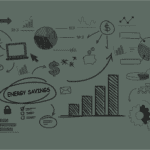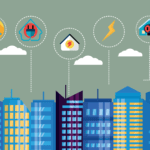Objectives
The high-level objective of EVIDENT is to translate behavioural interventions into real-world policies with significant environmental and economic returns. Within this project, we aim to answer the question, “how can behavioural interventions be included in the energy efficiency policy?” To accomplish this, EVIDENT adopts a threefold plan: very large participation of end users in the experiments, games and surveys; novel tools and methodologies to advance knowledge; and a digital platform for promoting energy efficiency.
Analyse the role of behavioural insights in energy efficiency
EVIDENT will use a large volumes of data to investigate factors that lead to decision-making. The project will collect data through field experiments and questionnaires; as well as from smart metering devices.
Develop digital tools
The project aims to create a digital ecosystem that will enable researchers to perform lab experiments using questionnaires in combination with serious games. Digital tools will help us reach out a very large number of participants at a much lower cost compared to the traditional methods.
Promote open data practices
Project data will be provided to the public in readable formats to allow for the greatest re-use. The project’s digital tools will assist in this endeavour by providing accessibility to third parties for enhancing future research in this domain.
Propose policy measures
EVIDENT will use five large-scale use cases to communicate results to policymakers. The use-case approach is more straightforward as it can provide insights into real-world conditions and evaluate the success of our approach.
Raise awareness
The project aims to disseminate its results using several mediums to raise public awareness about energy efficiency. For this reason, EVIDENT includes a detailed dissemination plan and will organise information campaigns targeting large audiences.
Commercialise and exploit the outcomes
EVIDENT aims to provide the energy industry and policymakers with the necessary innovation capacity to increase energy efficiency. The project will seek exploitation opportunities and will assist in technology diffusion.
Analyse the role of behavioural insights in energy efficiency
Evident will use a large collection of data to investigate factors that lead to decision-making. EVIDENT will collect data both data through field experiments and questionnaires; as well as from smart metering devices.
Develop digital tools
The project aims to create a digital ecosystem that will enable researchers to perform lab experiments using questionnaires in combination with a serious game. Digital tools will help us reach out a very large number of participants with a much lower cost compared to the traditional methods.
Promote open data practices
Project data will be provided to the public in readable formats, to allow for greatest re-use. The project’s digital tools will assist on this endeavor by providing accessibility to third parties for enhancing future research in this domain.
Propose policy measures
EVIDENT will use 5 large scale use cases n order to communicate results to policy makers. The use-case approach is more straightforward as it can provide insights on real-world conditions and evaluate the success of the EVDIENT’s approach.
Raise awareness
The project aims to disseminate its results using several mediums in order to raise public awareness for energy efficiency issues. For this reason EVIDENT includes a detailed dissemination plan and will organise information campaigns targeting a large audience.
Commercialise and exploit the outcomes
EVIDENT aims to provide energy industry and policy makers with the necessary innovation capacity to increase energy efficiency. The project will seek exploitation opportunities and will assist in technology diffusion.










 This project has received funding from the European Union’s Horizon 2020 research and innovation programme under grant agreement No
This project has received funding from the European Union’s Horizon 2020 research and innovation programme under grant agreement No